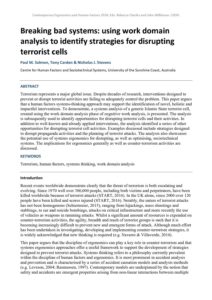| Document | Author Paul M. Salmon, Tony Carden & Nicholas J. Stevens |
| Abstract Terrorism represents a major global issue. Despite decades of research, interventions designed to prevent or disrupt terrorist activities are failing to adequately control the problem. This paper argues that a human factors systems-thinking approach may support the identification of novel, holistic and impactful interventions. To demonstrate, a systems analysis of a generic Islamic State terrorist cell, created using the work domain analysis phase of cognitive work analysis, is presented. The analysis is subsequently used to identify opportunities for disrupting terrorist cells and their activities. In addition to well-known and already applied interventions, the analysis identified a series of other opportunities for disrupting terrorist cell activities. Examples discussed include strategies designed to disrupt propaganda activities and the planning of terrorist attacks. The analysis also showcases the potential use of systems ergonomics for disrupting, as well as optimising, sociotechnical systems. The implications for ergonomics generally as well as counter-terrorism activities are discussed. |

